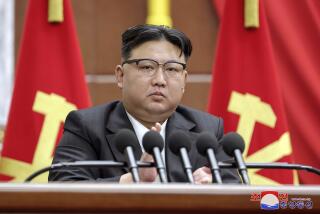N. Korea Nuclear Talks Conclude in China
- Share via
BEIJING — Talks aimed at halting North Korea’s nuclear weapons program wrapped up today, with U.S. officials citing “no breakthroughs” and bracing for a long road ahead.
“Looking at the last two days, I’d say there’s some good, some bad, some a little ugly,” a senior U.S. official said, speaking on condition of anonymity.
U.S. negotiators balked at capping the six-party meeting with a joint statement, the official said, because they didn’t think there had been enough progress to merit one.
But China released a statement saying the parties to the talks agreed to meet again before the end of September.
Published reports that the North Korean delegation had threatened to test its nuclear weapons if its proposals were not accepted were incorrect, the U.S. official said. In fact, he said, chief North Korean negotiator Kim Gye Gwan said in a bilateral meeting that some officials in his country wanted to test weapons.
“It was not phrased as a threat,” the U.S. official said. “It may be more rhetorical than real.”
The slow-burn crisis was sparked 20 months ago by North Korea’s disclosure that it had carried on a secret nuclear weapons program in violation of a 1994 nuclear freeze agreement. Participants in the talks are North and South Korea, the U.S., China, Japan and Russia.
The U.S. delegation opened the negotiations Wednesday with a proposal calling on Pyongyang to disclose all its nuclear weapons systems, agree to international monitoring and begin demobilizing its most dangerous weapons within an initial three-month period. In return, Pyongyang would receive immediate shipments of heavy fuel oil from Japan, South Korea and other nations and an interim U.S. pledge not to attack the isolated, impoverished Stalinist state.
Later on, North Korea would be required to dismantle its entire nuclear weapons program and allow international monitoring in return for aid, diplomatic recognition and a more permanent security agreement.
Even as the U.S. officials were talking, a low-level official stepped out of the North Korean Embassy and waded into a group of about 70 reporters.
Repeating North Korea’s position, the official said his country had been very flexible but needed the United States to end economic sanctions and remove Pyongyang from a list of state sponsors of terrorism.
“If the United States gives up its hostile policy toward us, we will give up all plans related to nuclear weapons,” he said.
China, meanwhile, tried to put the best light on the talks, given its role as host.
Foreign Ministry spokeswoman Zhang Qiyue said at a news conference Friday: “It’s a positive sign that the various sides want to study the various proposals.”
Although North Korea continued to deny the existence of a highly enriched uranium program, the U.S. official said, bilateral talks Thursday enabled the U.S. to clarify its admittedly complicated proposal to the North Koreans.
As late as Friday evening, the North Korean delegation was characterizing the U.S. proposal as “constructive” and something that was being studied seriously in Pyongyang, the U.S. official added.
“The meeting was not unfriendly in tone,” he said. “But there’s no question they want to offer as little as possible for the highest possible price.”
More to Read
Sign up for Essential California
The most important California stories and recommendations in your inbox every morning.
You may occasionally receive promotional content from the Los Angeles Times.













